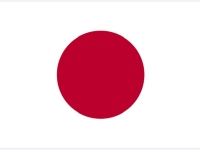Politics
JAPAN S DIPLOMACY IN 2016 REGARDING CHINA
SPEECH BY FOREIGN MINISTER KISHIDA

JAPAN FLAG
USPA NEWS -
A Policy speech was given by Foreign Minister Kishida at the Japan Institute of International Affairs Forum on January 19, 2016 regarding the Japan´s Diplomacy in 2016.
'The end of last year marked the 3rd year since I took office as Minister for Foreign Affairs in the Abe Cabinet. In diplomacy,...
'The end of last year marked the 3rd year since I took office as Minister for Foreign Affairs in the Abe Cabinet. In diplomacy,...
A Policy speech was given by Foreign Minister Kishida at the Japan Institute of International Affairs Forum on January 19, 2016 regarding the Japan´s Diplomacy in 2016.
'The end of last year marked the 3rd year since I took office as Minister for Foreign Affairs in the Abe Cabinet. In diplomacy, 'strategy' and 'principles' are important. Since the inauguration of the Abe Cabinet in late 2012, I have visited 41 countries, spearheading Japanese diplomacy under the banner of 'Proactive Contribution to Peace' based on the principle of international cooperation. So far, I have held more than 250 meetings with Foreign Ministers from 104 countries.
Adding meetings with other dignitaries such as Presidents, Prime Ministers, and members of royal families, I have held more than 590 meetings altogether. In meetings with heads of state and government and foreign ministers of various countries, I stressed Japan´s approach of consistently placing emphasis on basic values including freedom and democracy, the rule of law and peaceful settlement of disputes through dialogue. I have the sense that Japan´s presence in the international stage has significantly grown through such efforts in the increasingly severe global environment.
This year, Japan is blessed with a golden opportunity to make a powerful stride in its diplomacy. For one, Japan holds the G7 Presidency. The G7 Summit will be held in Japan for the first time in eight years. Moreover, starting this year, Japan is serving as a non-permanent member of the United Nations Security Council for 11th time, the highest count in the world. It is often said that results are what matters in politics - that is also true to diplomacy. I am determined to ensure that Japan will play a leading role in pursuing peace and prosperity in the international community by making the most of these opportunities.
(...)
(...)
CHINA
Next, I will talk about China. In the past several years, the relationship between Japan and China had been particularly tense. However, since the Japan-China summit meeting held in November 2014, I believe the relationship has been basically heading toward improvement. I have had six meetings with Chinese Minister of Foreign Affairs Wang Yi and engaged in frank exchange of opinions with him. Throughout these experiences, I have been thinking of how the relationship between Japan and China should be like in a new era.
Next, I will talk about China. In the past several years, the relationship between Japan and China had been particularly tense. However, since the Japan-China summit meeting held in November 2014, I believe the relationship has been basically heading toward improvement. I have had six meetings with Chinese Minister of Foreign Affairs Wang Yi and engaged in frank exchange of opinions with him. Throughout these experiences, I have been thinking of how the relationship between Japan and China should be like in a new era.
China is the world´s second largest economy and Japan is the third largest. The two countries have considerable influence on and bear responsibility for the peace and prosperity of Asia and the world. Some people say that Japan may have the feeling of nervousness about China´s continuing development. However, I heartily welcome China´s development. Japan´s development would be inconceivable without China, and without Japan, China´s development would be inconceivable as well. Cooperating with each other for long-term peace and friendship is the only option available for both Japan and China.
Moreover, there are common interests between Japan and China. For Japan, China is the largest trading partner, and for China, Japan is the second largest trading partner. In China, there are approximately 23,000 Japanese companies, making Japan the largest source of foreign companies operating in China and they create a large amount of employment in China. Clearly, the economic relationship between the two countries is extremely close. There is a wide range of potential areas of cooperation, including energy conservation, the environment, countermeasures against an aging society and low birth rate, tourism and disaster management.
In addition, it is extremely important for the international community that China carry out sound reforms, respect global standards and ensure transparency.
At the same time, the relationship between Japan and China faces serious and new difficulties. In particular, the recent unilateral attempts by China to change the status quo in the South China Sea and the East China Sea have become an issue of concern for the region and the international community. While it is natural to protect sovereignty and territorial integrity, the respect for and maintenance of international order based on the universally recognized principles, such as open seas and the rule of law, is a basic principle of diplomacy for Japan as a trade-oriented nation.
At the same time, the relationship between Japan and China faces serious and new difficulties. In particular, the recent unilateral attempts by China to change the status quo in the South China Sea and the East China Sea have become an issue of concern for the region and the international community. While it is natural to protect sovereignty and territorial integrity, the respect for and maintenance of international order based on the universally recognized principles, such as open seas and the rule of law, is a basic principle of diplomacy for Japan as a trade-oriented nation.
As such, the relationship between Japan and China faces new possibilities and emerging challenges. Therefore, what is needed is to ensure a more constructive and creative response by both sides than ever before. Engaging in dialogue precisely because there are issues to address is the consistent position of the Abe Cabinet. At the Japan-China summit meeting held in Seoul in November last year, the two leaders agreed to resume mutual visits by Foreign Ministers.
I would like to promote the relationship between the two countries while continuously engaging in dialogue with Minister Wang, not only looking ahead to the occasion of the Japan-China High-Level Economic Dialogue to be held early this year, but also taking into account the possibility of my visit to China toward spring this year.
In Taiwan, the presidential election was held on January 16, and Dr. Tsai Ing-wen was elected.
In Taiwan, the presidential election was held on January 16, and Dr. Tsai Ing-wen was elected.
We believe that the smooth implementation of the election demonstrates how mature Taiwan´s democracy is. Japan supports a stable cross-strait relationship through dialogue and intends to promote further cooperation and exchange with Taiwan based on the Joint Communique of the Government of Japan and the Government of the People´s Republic of China.'
(...)
Source : Ministry of Foreign Affairs of Japan
Ruby BIRD
http://www.portfolio.uspa24.com/
(...)
Source : Ministry of Foreign Affairs of Japan
Ruby BIRD
http://www.portfolio.uspa24.com/
Prosperity Peace Japan Republic Of China North Korea Jiia Forum Diplomacy Japan Foreign Minister Kishida Tokyo Pyongyang Beijing Ruby Bird
Liability for this article lies with the author, who also holds the copyright. Editorial content from USPA may be quoted on other websites as long as the quote comprises no more than 5% of the entire text, is marked as such and the source is named (via hyperlink).






